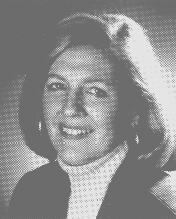Page 1
[Begin Tape 1, Side A]
Ritchie: I thought we could start by your telling me a little bit about your mother [Ellen Weinstein Holtz] and father [Jackson Jacob Holtz] and their background.
Goodman: My father was the fourth child of his family, who were German Jewish immigrants, and he was the first born in America. I could figure out how old he would be, but I'm sure you can, too. He grew up in the West End of Boston in quite a poor family. His mother ran a small grocery store, and his father, as far as I was ever able to tell, didn't do much of anything. He was a philosopher, perhaps. But not that he was a ne'er-do-well. I think they just ran this grocery store, but his mother actually ran the grocery store. My father didn't talk all that much about his childhood, except to tell sort of stories about it, because I think it wasn't unhappy, but it wasn't tremendously happy. He was part of that generation of immigrants who jumped almost two classes in one generation in some ways. I would say that though his parents were Jewish, he had no religious upbringing at all; in fact, his father was an atheist. And he was not Bar Mitzvahed, which was very unusual for that generation.
He went to Boston English High School, which was what we call a magnet school, and started college when he was about fifteen.
Ritchie: What would they have called the school in those days?
Goodman: Maybe an exam school. There was Boston Latin and Boston English. I'm not sure what they would have called it. He went to Boston University when he was fifteen, on what was called a James M. Storrow Fellowship. Years later, my father was a state legislator, and he named Storrow Drive after James. Storrow was an old Boston Yankee. He had that scholarship, and he went to B.U. and B.U. Law School in a five-year program, something like thatóit's all a little fuzzyóand wrote for what was then called the Bean Pot. I have some strange old publications, including some truly sophomoric humor that he wrote. He was a very lively, very articulate, very attractive young man. I've seen pictures of him.
He became a lawyer. As a young man, he became a state representative from what was then Ward Fourteen, which was the old Jewish district; now it's Roxbury; Mattapan, Blue Hills Avenue. It's a black district mostly. Ward Fourteen was a Jewish district at that time, and he was the first of the new generation to be a legislator from there; there had been quite a different, less educated, more immigrant representative. The campaign that he ran to become a state legislator was actually a changing of the guard at that time. He became a state legislator. We're now in the thirties, early thirties. In fact, [he] introduced child labor legislation into the State of Massachusetts. Years and years and years later, Tip O'Neill would rememberóhe's one of these people with extraordinary memoriesóand he would remember my father's speech about child

